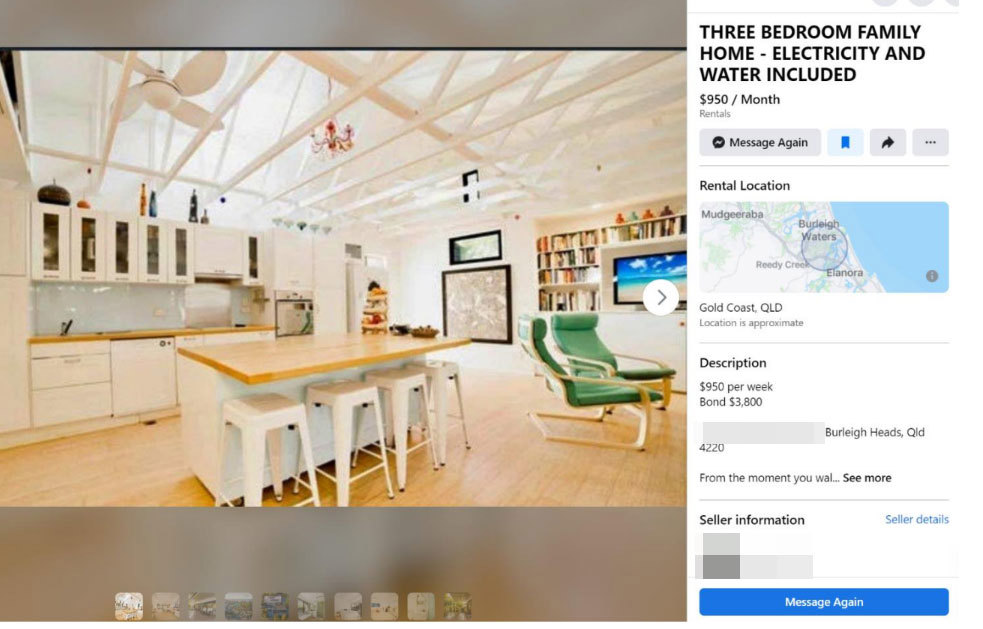Scammers are taking to social media sites such as Facebook to rip off house hunters desperate to snare a rental amid near-record low vacancy rates.
Gold Coast renter Stefana Vella, who manages a clothing store in Burleigh Heads, was facing her third move in four months when she first came into contact with one of the scammers a few weeks ago.
Vella said she had a perfect rental history, but, as a single woman with a pet dog, she found herself getting rejected time and again by real estate agents who wanted a tenant to "tick all of their boxes perfectly".
READ MORE: Australia setting up new agency to fight cyber-crime

With her landlord set to sell the granny flat she had been living in, Vella said she had looked at more than 100 properties since November.
Vella was searching everywhere possible for a rental, including on social media.
"It was taking me a long time to find something," Vella said.
"My girlfriends were sending me links from things they had seen on Facebook Marketplace."
Rental vacancy rates for the central Gold Coast area came in at a tiny 0.7 per cent last month, according to the latest data from SQM research.
In the meantime, prices for rental homes in the area surged 28.5 per cent over the last year and 26.2 per cent for units.
"There's just so much price-gouging with rent. I run a store in the heart of Burleigh Heads. I've been a local for years, but I've been priced out of my own community," Vella said.
So when a friend sent Vella a link to a Facebook Marketplace advertisement for a three-bedroom house for rent in Burleigh Heads at $950 per week, she jumped on it.
"It looked perfect and it was in my area. It was being rented privately so straight away I reached out to the man who was listed as the local contact," Vella said.

Vella said she was then passed on to a woman who claimed to be the owner of the property.
Not wanting to miss out on the property, Vella said she sent the woman all of her references and her recent bank statements.
The owner told Vella she was overseas, but that Vella seemed like a perfect tenant for the property.
Vella said she was told she would need to put a deposit down in order to secure the property, with the bond listed at $3800.
Not willing to pay the money without seeing the property, Vella asked both of the parties involved if she could arrange an inspection.
"The lady then became quite nasty, threatening that I would lose my chance if I didn't give them money," Vella said.
"Obviously I didn't want to do that. I was highly suspicious that it was a scam, so I went to the property to have a look for myself.
"They had told me the unit was empty, but when I went there I could see there was a bin out and it looked like people were living there.
"This confirmed for me that it was a scam."
READ MORE: Where rents are up almost 50 per cent in the last year

A Google search of the property address provided further proof.
The same unit was listed on real estate site Domain as having been rented out by a real estate company a month earlier, in January.
Identical photos had been used to advertise the property on Domain as on the Facebook Marketplace posting, making it clear the scammer had simply lifted the photos from the real estate agent's ad.
Chief executive officer of the Real Estate Institute of NSW, Tim McKibbin, said he had heard of scammers using similar tactics and stealing images from bonafide real estate agents in NSW.
While real estate scams became common on social media a few years ago, back then it was largely confined to the holiday and short-term rental market, McKibbin said.
However, the scammers were growing ever more prolific and now appeared to be targeting the long-term rental space, he added.
"People are just desperate because trying to find a rental property now is a real challenge," McKibbin.
McKibbin said that not only were real estate agents routinely seeing lines snaking down the street of house hunters at rental property openings, but he was also hearing of buyers agents fielding calls from potential renters trying to get ahead of the game when a property sold to an investor.
House hunters should be wary of following any type of property lead on social media, McKibbin said.
"I think the message needs to get to consumers that if you are not going directly through a recognised channel - either an agent or an owner, who you have confidence is the real owner - unless you're doing that, you really are at risk," he said.
Vella said she was so incensed by the actions of the scammers that she took her investigations one step further, creating a fake email to message the woman who claimed to be owner of the property and pretending to be a new potential victim.
After playing along with the scam, Vella said the woman requested she send her ID.
Vella was told once her ID was verified she would be asked to pay for the unit's bond in Bitcoin.
While she has since managed to find a property to rent through personal connections, Vella said she felt compelled to speak out about her experience in order to warn other more vulnerable members of society.
"These people must be exposed and stopped," Vella said.
A spokesperson for Meta, the owner of Facebook, said scammers were presenting a challenge in all online environments, and marketplaces were no exception.
"We're committed to safeguarding the integrity of our services, and dedicate substantial resources and technology solutions to protect our community from fake accounts and other inauthentic behaviour," the spokesperson said in a statement.
"We also encourage users to take steps to protect themselves, such as checking reviews of online sellers, not handing over money until you see the item for sale, and using payment options that provide strong protections."
Sign up here to receive our daily newsletters and breaking news alerts, sent straight to your inbox.
